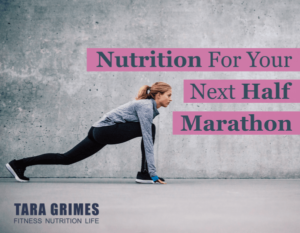Nutrition for a half marathon is so important. Straight off the bat, I want to stress that you should never, ever try anything new with your nutrition on race day that you haven’t practised during your prep or training for a half marathon or full marathon. I’ve ran marathons with people who have gobbled down so called healthy “energy bars” prior to the race, having never tried them before in training, because they saw others doing it on the day, and they ended up panicking half way through the race, with the dreaded scoots!
Figure out what works for you and stick to it.
Before
I’m assuming at this stage that prep for the upcoming half marathons is almost complete. However, it’s important to take into consideration the following elements during training.
Energy availability is the single most important aspect of Sports Performance Nutrition Strategy. Ensure you are eating enough calories to fuel your training and your race on the day. Use a calorie calculator online to ensure you eating sufficient daily calories for your training and race. Calorie intake is very specific to each individual so don’t copy anyone else’s nutrition plan or calorie intake.
Macros is second on the list of priorities when considering nutrition for performance. It’s essential that carbs or glycogen stores are plentiful in the muscle to positively impact performance on race day. This is what’s known as “carb loading”! However, don’t go too mad on the carbs as it can also cause fluid retention, which can impact performance as 1 gram of glucose holds 3 grams of water in the muscle cell.
1-4g carbohydrate per KG of body weight, 1-4 hours before exercise (Burke et al 2011) is perfect.
Food preparation is also encouraged according to the practicalities of the event as races normally have very early starts.
Try and avoid high fibre carbohydrates which can upset the gut and may cause digestive discomfort. It’s also suggested to eat low fat as well as low fibre pre-race.
During
There are many benefits to consuming carbohydrates during the run for optimising race nutrition (Karelia et al 2010). If you are intending to complete the race in over 1hour 30 minutes, then it’s suggested to consume exogenous forms of carbs e.g. glucose gels or other fast releasing forms of sugar that you have practised in training. If you are under 1hour and 30 mins then studies show that carbohydrate mouth rinsing can improve endurance performance by 2-3% (Jeukendrup & Chambers 2010). Alternatively, you can rely on water or sports drinks, and your body’s own glycogen stores to carry you along.
Aside from the above suggestions ensure you are well hydrated pre-race. A well hydrated rule of thumb is when your urine is lighter than straw colour. If it’s anything darker you need to start drinking more. Try not to go too mad hyper hydrate. Ensure you have a water supply/sports drink on hand to hydrate throughout race.
Race Nutrition Strategies need to be planned, practised and purposeful.
If you require a more personalised and specific approach to your nutrition, whether it’s for sports performance or weight management then contact me on [email protected] or visit my website www.taragrimesfitness.com
Facebook: Tara Grimes Fitness
Instagram: @taragrimesfitness


